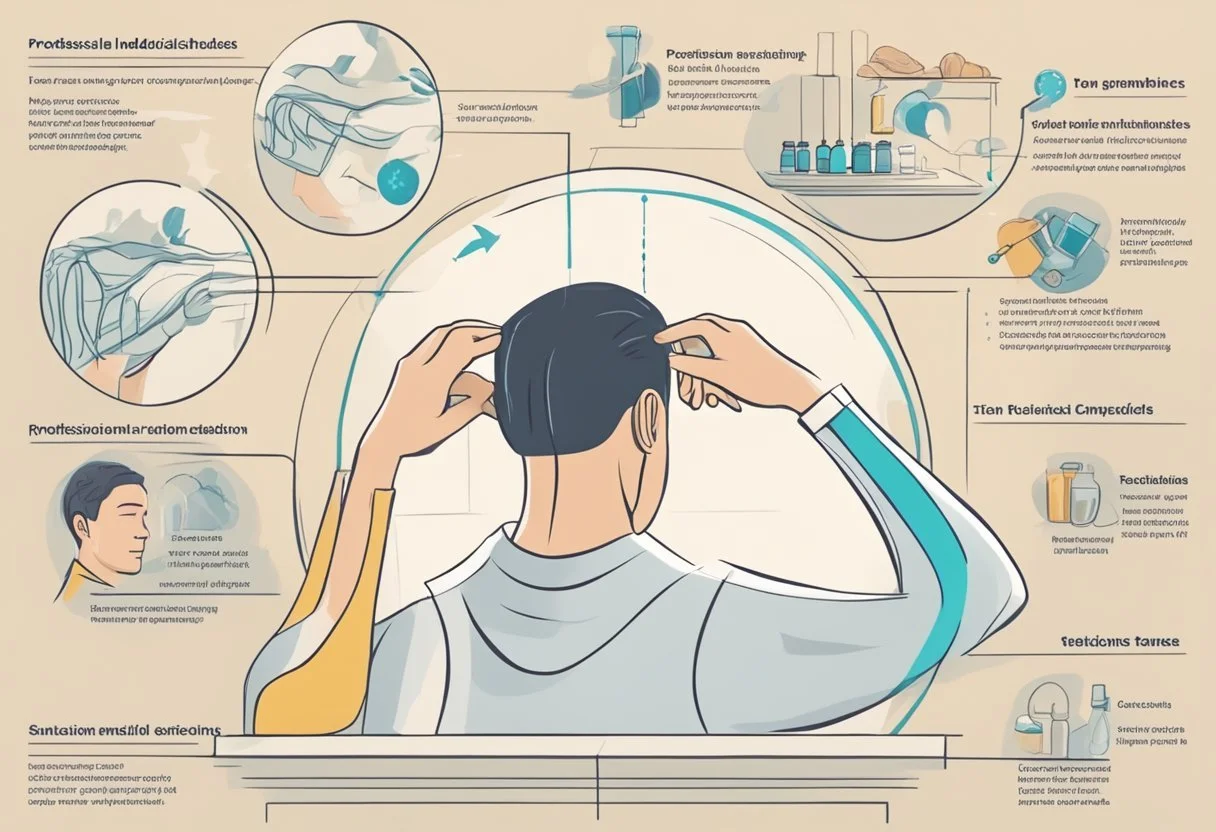Tension Headache
Symptoms, Causes, and Home Remedies
Discover > Health Conditions > Tension Headache
Tension headaches are often described as a tight band around the head or a constant pressure-like sensation. These headaches, known to be the most common type of headache, can last for hours or even days, causing significant discomfort and impaired daily functioning. Although not as severe as migraines, tension headaches can still be quite debilitating and negatively impact one's quality of life.
The underlying causes of tension headaches are multifaceted, ranging from poor posture and eye strain to stress and anxiety. Identifying the triggers and understanding the symptoms can be crucial in effectively managing and treating tension headaches. Apart from medication, many individuals turn to home remedies, such as relaxation techniques and lifestyle changes, to help alleviate the pain and minimize the frequency of headache episodes.
In this article, we will explore the telltale signs and symptoms of tension headaches, shed light on the possible causes, and provide valuable insight into some home remedies that may alleviate discomfort and help prevent future occurrences. By gaining a deeper understanding of this common ailment, individuals can take proactive steps towards addressing the causes, managing the symptoms, and ultimately improving their overall wellbeing.
Understanding Tension Headaches
Tension headaches, also known as tension-type headaches, are the most common type of headache experienced by adults. They can be classified into two main types: episodic tension headaches, which occur less frequently, and chronic tension headaches, which occur more often and can last for extended periods.
Symptoms of Tension Headaches
Tension headaches typically cause a dull, aching sensation, usually felt on both sides of the head or around the forehead. Some common symptoms associated with tension headaches include:
Pain: Mild to moderate pain or pressure usually experienced in the front, top, or sides of the head
Tightness: Sensation of a tight band or pressure around the head
Muscle tenderness: Soreness in the neck, shoulder, and scalp muscles
It's important to note that unlike migraines, tension headaches generally do not cause severe symptoms such as nausea, vomiting, or visual disturbances.
Causes and Risk Factors
There isn't a single known cause for tension headaches, but various factors can contribute to their onset. Some common causes and risk factors include:
Stress: Mental and emotional stress, anxiety, or depression can trigger tension headaches
Muscle strain: Prolonged muscle tension in the head, neck, and shoulders due to poor posture, eye strain, or repetitive motion
Sleep disturbances: Insufficient or irregular sleep and sleep disorders
Dehydration: Not drinking enough water can lead to tension headaches
Caffeine: Overconsumption or withdrawal from caffeine can cause headaches
Identifying Triggers and Prevention Strategies
Common Triggers for Tension Headaches
Tension headaches can be caused by various factors. Some common triggers include:
Stress: Work, family, or financial problems can lead to higher levels of stress, which can result in tension headaches.
Poor posture: Sitting or standing in an awkward position for an extended period of time may cause muscle strain and trigger headaches.
Eye strain: Prolonged screen use and poorly lit environments can strain the eyes and contribute to tension headaches.
Dehydration: Inadequate fluid intake can lead to headaches, as proper hydration is vital for the body to function optimally.
Lack of sleep: Sleep deprivation can increase the risk of tension headaches as your body needs adequate rest to recover and regenerate.
Prevention Through Lifestyle Changes
Adopting healthier habits and making lifestyle changes can help prevent tension headaches:
Exercise: Engage in regular physical activity, such as walking, swimming, or yoga, to maintain overall health and relieve stress.
Sleep: Prioritize quality sleep by establishing a consistent sleep schedule and creating a relaxing bedtime environment.
Diet: Eat a balanced diet with a variety of fruits, vegetables, whole grains, lean proteins, and healthy fats to provide essential nutrients.
Hydration: Drink enough water throughout the day to remain well-hydrated and potentially reduce the frequency of headaches.
Posture: Make a conscious effort to maintain good posture while sitting and standing to prevent muscle strain and tension headaches.
Stress Management Techniques
Employing various stress management techniques can help reduce tension headache frequency and improve overall well-being:
Relaxation techniques: Practice deep breathing exercises, progressive muscle relaxation, or meditation to alleviate stress and induce relaxation.
Yoga: Incorporate yoga into your routine to improve flexibility, balance, and strength while promoting mental relaxation.
Biofeedback: Through biofeedback therapy, learn to recognize and control your body's response to stress, potentially reducing headache frequency.
Cognitive-behavioral therapy (CBT): CBT may help you identify the sources of stress, develop coping strategies, and modify negative thoughts and behaviors that contribute to tension headaches.
Home Remedies and Self-Care
Simple Pain Relief Techniques
There are several home remedies that can offer relief from tension headaches. One effective method is to apply ice or heat to the affected region, as it helps alleviate tension in the neck and shoulder muscles. For instance, consider using an ice pack for 15-20 minutes at a time, but ensure to wrap it in a towel to prevent frostbite. Alternatively, you can apply a heating pad to the tense areas for similar durations, but be cautious of overheating.
Another approach to ease muscle tension is through massage. Gentle self-massage can provide relief by loosening tight muscles in the neck, shoulders, and head. Here is a simple technique to follow:
Sit comfortably with your back straight
Use your fingertips to gently apply pressure on the base of your skull, temples, and the area behind your ears
Move in circular motions while applying pressure, gradually working your way down to your neck and shoulders
Importance of Proper Hydration and Nutrition
Maintaining proper hydration and nutrition is essential to preventing tension headaches. Dehydration can trigger headaches, so it is crucial to drink enough water throughout the day. Aim for at least 8 cups (64 ounces) of water daily, as medical professionals recommend. Furthermore, reduce caffeine and alcohol consumption, which can lead to dehydration and headaches.
Eating regular meals, including a nutritious breakfast, is crucial in preventing tension headaches. Skipping meals can cause low blood sugar levels, triggering headaches. Incorporate a balanced diet with fruits, vegetables, lean proteins, and whole grains for overall health.
Relaxation and Physical Therapies
Incorporating relaxation techniques into your daily routine may help with managing muscle tension. The following are popular methods to try:
Deep breathing exercises: Practice slow and controlled inhales through your nose, followed by exhales through your mouth.
Progressive muscle relaxation: Gradually tense and relax different muscle groups, starting from the head and working down to the feet.
Meditation: Sit comfortably in a quiet space, close your eyes, and focus on your breath.
Engaging in regular physical activity can also help reduce the frequency and severity of tension headaches. Stretching, walking, swimming, and yoga are low-impact exercises that can release tension and improve overall wellness.
Professional Medical Treatment Options
Over-the-Counter Medications
For tension headaches, over-the-counter (OTC) medications can be an effective first-line treatment. The most common OTC medicines used to treat tension headaches include:
Acetaminophen (such as Tylenol): It helps alleviate pain without posing a significant risk of stomach irritation or digestive problems.
Aspirin: It can be a useful option but is contraindicated for children under 16 due to the risk of Reye's syndrome.
Ibuprofen (like Advil, Motrin): A popular choice, this nonsteroidal anti-inflammatory drug (NSAID) can help relieve pain and inflammation.
Naproxen (such as Aleve): Another NSAID, this option provides longer-lasting relief compared to other OTC medications.
Keep in mind that excessive use of these medications could lead to medication overuse headaches, so follow the dosage recommendations and consult a pharmacist if you're unsure.
Prescription Medications and Advanced Therapies
When OTC medications do not provide adequate relief, healthcare providers may prescribe stronger medications or recommend advanced therapies, including:
Indomethacin and ketorolac: These prescription-strength NSAIDs can be more effective in managing severe tension headaches.
Muscle relaxant medications: They help ease muscle tension contributing to the pain, particularly when used in conjunction with other therapies.
Tricyclic antidepressants: In some cases, low doses of these medications can prevent tension headaches when taken daily.
Remember that these prescription medications should be used under the supervision of a healthcare professional, and it is crucial to discuss potential side effects or interactions with them.
When to See a Doctor
It is essential to consult a healthcare provider in the following situations:
If your tension headaches persist despite OTC treatments or worsen over time.
When the frequency of your headaches increases dramatically.
If you experience new symptoms such as loss of balance, difficulty speaking, or visual disturbances.
In case you suspect medication overuse headaches due to excessive OTC intake.
A healthcare professional can help tailor a treatment plan to your specific needs and recommend lifestyle changes or other therapies that may help alleviate your tension headaches. Overall, a proactive approach to seeking medical assistance can greatly improve your quality of life.
Monitoring and Managing Chronic Cases
Headache Diaries and Recognizing Patterns
For individuals suffering from chronic tension headaches, maintaining a headache diary can be an invaluable tool in managing and reducing their frequency. This involves keeping a detailed record of headaches, including their timing, duration, intensity, and any potential triggers, such as stress or certain foods. By identifying patterns and potential causes, individuals can take proactive steps to minimize the factors contributing to their tension-type headaches. Using markdown or other formatting tools, such as tables, can help organize the information for easier analysis.
Long-Term Management Strategies
Developing long-term management strategies is crucial for improving the quality of life for those with chronic tension headaches. Some effective approaches include:
Stress management: Implementing relaxation techniques, such as deep breathing exercises, progressive muscle relaxation, and meditation, can help reduce stress and prevent headache onset.
Regular exercise: Engaging in physical activities like yoga, Tai Chi, or aerobic exercise not only promotes overall health but can also help manage stress levels and reduce headache frequency.
Sleep hygiene: Establishing a consistent sleep schedule and creating a comfortable sleep environment can greatly impact the frequency and intensity of tension headaches.
Healthy eating habits and hydration: Maintaining a balanced diet and staying well-hydrated can play a significant role in managing headaches.
Medication management: For some, medication may be necessary to alleviate chronic headaches. However, it is important to avoid medication overuse, as it can lead to rebound headaches. It is advised to work closely with a healthcare professional to determine the appropriate treatment plan.
Seeking Specialist Care
In certain cases, individuals may benefit from seeking specialist care for their chronic tension headaches. When the frequency, duration, or intensity of headaches continue to interfere with daily activities or worsen despite attempting home remedies and long-term management strategies, it is advisable to consult a healthcare professional. They can provide a comprehensive evaluation, assist in identifying and addressing any underlying issues, and offer personalized treatment options tailored to the individual's needs. Regular follow-ups with the specialist can help track progress and adjust management strategies as needed.
Additional Considerations
Potential Complications and Secondary Causes
Although tension headaches often result from stress and muscle tension, there may be secondary causes and potential complications that warrant further attention. For instance, a persistent fever or weakness accompanying a headache can signal an underlying infection. Additionally, a recent head injury might lead to post-traumatic headaches, which require medical evaluation. It is essential to consider causes like a tumor or brain tumor, as these can present with headaches as well. In rare cases, severe headaches may also be a symptom of a stroke. If you experience any of these accompanying symptoms, it's crucial to consult a healthcare professional immediately.
Understanding Diagnostic Tests
Your healthcare provider may perform a range of diagnostic tests to determine the cause of your headaches. While x-rays are not commonly used for headache diagnosis, other imaging tests like MRI and CT scans can help identify underlying issues like tumors or brain abnormalities. These tests are important to rule out any potential complications or secondary causes. Additionally, your healthcare provider may assess your medical history, perform a physical examination, and ask about other symptoms like numbness, pressure, sensitivity to light, and light sensitivity.
Dealing with Side Effects of Medication
It is crucial to be aware of the potential side effects of headache medications. Common medication side effects include:
If you notice any unusual or persistent side effects, consult with your healthcare provider. They may suggest alternative treatments or adjust your dosage to minimize the adverse effects. Additionally, you can modify your lifestyle to incorporate healthy habits, such as exercise, good nutrition, and stress management.
Always follow your healthcare provider's instructions and report any new or worsening symptoms while on medication.
Conclusion
In managing tension headaches, preventive measures and effective management are crucial to improving daily life. Simple lifestyle changes and self-care practices can significantly reduce the frequency and severity of these headaches.
Practicing relaxation techniques like deep breathing exercises, yoga, and meditation can help manage stress and alleviate tension headaches. Maintaining a regular sleep schedule and incorporating physical activity into daily routines are also essential steps in promoting overall well-being.
Adopting a healthier diet and staying well-hydrated throughout the day are highly recommended tips to prevent tension headaches. It is wise to avoid triggers such as excessive caffeine intake, alcohol, and other dietary triggers.
A few proven home remedies for managing tension headaches include:
Warm or cold compresses
Over-the-counter pain relievers like ibuprofen or aspirin
Stretching and neck massages
Aromatherapy using essential oils like lavender, peppermint, or eucalyptus
It's essential to be more cognizant of the factors that contribute to tension headaches. Keeping a headache diary may help track the triggers, allowing for better prevention and management of these headaches.
If tension headaches persist or worsen, it is highly advisable to consult a healthcare professional, as they can provide more tailored guidance on prevention, treatment, and pain management.
It's natural to have questions about managing tension headaches, so do not hesitate to consult reliable sources or your healthcare provider for accurate and up-to-date information. Empower yourself with knowledge and make informed decisions that will help promote your well-being and minimize the impact of tension headaches on your daily life.
#chronic tension type headache #headache pain #episodic tension type headache #headaches occur #prevent headaches #chronic tension headache #headache triggers





